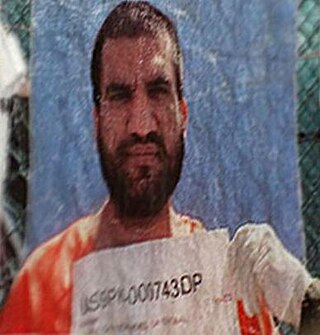
Muhammad Saad Iqbal is a Pakistani citizen who was held in extrajudicial detention in the United States Guantanamo Bay detention camps, in Cuba. Madni's Guantanamo Internment Serial Number was 743. The Department of Defense reports that he was born on October 17, 1977.
Hajji Nasrat Khan is an elderly citizen of Afghanistan best known for the more than three years he spent in extrajudicial detention in the United States Guantanamo Bay detention camps, in Cuba. The United States Department of Defense believed that he was an enemy combatant and assigned him the Internment Serial Number 1009.
Ahmad Tourson or Ahmad Abdulahad, is a Uyghur refugee unlawfully detained for more than seven years in the United States Guantanamo Bay detainment camps. The detention occurred despite becoming clear early on that he was innocent. The Department of Defense reports that Tourson was born on January 26, 1971, in Xinjiang Province, China, and assigned him the Internment Serial Number 201. Tourson is one of approximately two dozen detainees from the Uighur ethnic group.
Dawut Abdurehim is a Uyghur refugee best known for the more than seven years he spent in the United States Guantanamo Bay detention camps, in Cuba. Abdulrehim is one of 22 Uighurs who have been held in Guantanamo for many years despite it becoming clear early on that they were innocent.
Starting in 2002, the American government detained 22 Uyghurs in the Guantanamo Bay detainment camp. The last 3 Uyghur detainees, Yusef Abbas, Hajiakbar Abdulghupur and Saidullah Khali, were released from Guantanamo on December 29, 2013, and later transferred to Slovakia.
Shawali Khan is a citizen of Afghanistan, who was held in extrajudicial detention in the United States Guantanamo Bay detainment camps, in Cuba. His Guantanamo Internment Serial Number was 899. American intelligence analysts estimate he was born in 1963, in Kandahar, Afghanistan.

Mohammed Fenaitel Mohamed Al Daihani is a citizen of Kuwait who was held in extrajudicial detention in the United States Guantanamo Bay detention camp, in Cuba. Al Daihani's Guantanamo Internment Serial Number was 229. Joint Task Force Guantanamo counter-terrorism analysts reports that Al Daihani was born on November 4, 1965, in Kuwait City, Kuwait. Al Dehani was repatriated without charges on November 2, 2005.
Faris Muslim al Ansari is a citizen of Afghanistan who was seventeen years old when captured and held in the United States's Guantanamo Bay detention camps, in Cuba. His Guantanamo Internment Serial Number was 253. American intelligence analysts estimate that Al Ansari was born in 1984 in Mukala, Yemen.
Abib Sarajuddin is a citizen of Afghanistan, who was held in extrajudicial detention in the United States Guantanamo Bay detention camps, in Cuba. His Guantanamo Internment Serial Number was 458. Guantanamo intelligence analysts estimate that he was born in 1942.

Mohammed Ahmed Said Haidel is a citizen of Yemen, who was held in extrajudicial detention in the United States Guantanamo Bay detention camps, in Cuba. His Guantanamo Internment Serial Number is 498. Joint Task Force Guantanamo counter-terrorism analysts estimate that he was born in 1978, in Ta'iz, Yemen.
Abdul Majid Muhammed is a citizen of Iran who was held in extrajudicial detention in the United States Guantanamo Bay detention camp in Cuba.

Othman Ahmed Othman Al Omairah was a citizen of Saudi Arabia who was held in extrajudicial detention in the United States Guantanamo Bay detainment camps, Cuba.
Counter-terrorism analysts prepared a Summary of Evidence memo for the Administrative Review Board hearings of approximately 460 captives in the Guantanamo Bay detention camps, in Cuba from December 2004 to December 2005.
Initially the Bush Presidency asserted that they did not have to release any of the Guantanamo captive's documents. They asserted that no captive apprehended in Afghanistan was entitled to the protections of the Geneva Convention, and that those held in the Guantanamo Bay Naval Base were not protected by US law either, because it was not on US territory.

Omar Said Salim Al Dayi, also known as Omar Said Salem Adayn and Omer Saeed Salem Al Daini, is held in extrajudicial detention in the United States Guantanamo Bay detention camps, in Cuba. His Guantanamo Internee Security Number is 549.

Abdul Latif Nasir is a Moroccan man formerly held in administrative detention in the United States Guantanamo Bay detention camps, in Cuba. His Guantanamo Internment Serial Number was 244. Joint Task Force Guantanamo counter-terrorism analysts report he was born on March 4, 1965, in Casablanca, Morocco. Abdul Latif Nasir and Sufyian Barhoumi tried to file emergency requests to be transferred from Guantanamo in the final days of Barack Obama's presidency.
Rafiq Bin Bashir Bin Jalud al Hami is a citizen of Tunisia, who was formerly held for over seven years without charge or trial in the United States's Guantanamo Bay detention camps, in Cuba. His Guantanamo Internment Serial Number was 892. The Department of Defense reports that he was born on 14 March 1969, in Tunisia.





